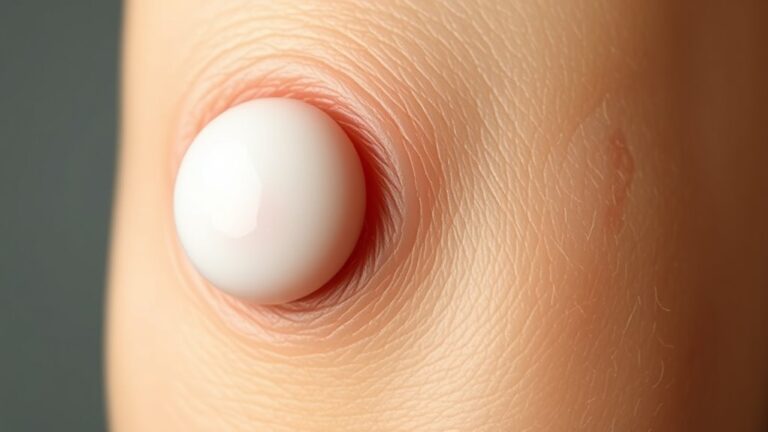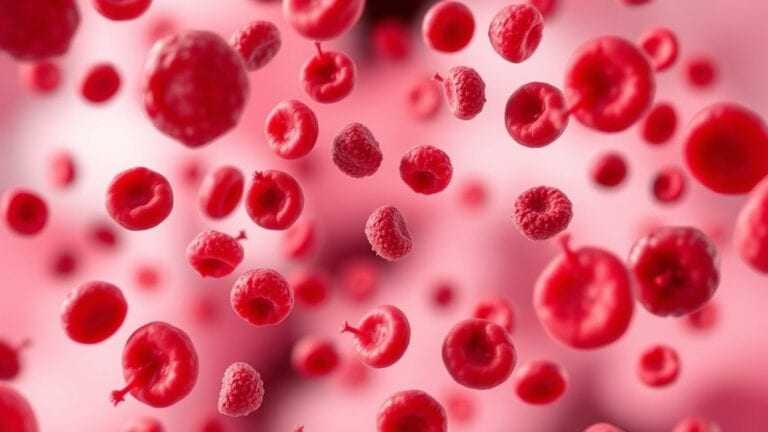You may consider pickle juice is just leftover brine, but drinking a little every day could do more for your health than you realize. It’s packed with electrolytes to fight cramps, helps balance blood sugar, and even supports gut health with natural probiotics. Whether you’re recovering from a workout or just looking for a low-calorie way to stay hydrated, this tangy liquid has concealed perks worth exploring. Who knew something so simple could be so good for you?
Relief From Muscle Cramps
Should you have ever woken up with a sudden muscle cramp, you know how painful and frustrating it can be—but relief could be sitting in your fridge.
Pickle juice offers rapid relief from muscle cramps, often working faster than water. The vinegar in it can slow down nerve signals that trigger cramps, while the sodium content helps restore balance.
Research suggests just 1/3 cup can greatly reduce circulating cramp severity, with studies showing effectiveness even in serious cases like cirrhosis. Unlike some remedies, it’s safe with no major side effects.
Beyond cramps, its health benefits include easing post-workout soreness.
Keep a jar handy—you could find it’s your new go-to for quick, effective relief whenever cramps strike.
Hydration Support and Low-Calorie Recovery Aid
You may not consider pickle juice as a go-to for hydration, but its mix of sodium and potassium makes it great for refueling after a sweat session.
It’s a low-calorie option compared to sugary sports drinks, so you won’t undo your workout progress.
Just keep in mind that should you be watching your sodium intake, you’ll want to check with your doctor initially.
Electrolyte Replenishment
After sweating it out during a long workout or in scorching heat, your body loses essential electrolytes—and that’s where pickle juice steps in. Packed with sodium and potassium, it helps restore electrolyte balance fast, especially post-exercise at the moment you’re dehydrated.
Unlike sugary sports drinks, pickle juice is a low-calorie alternative that won’t derail your diet while aiding recovery. Just a small sip (about 1/3 cup) can replenish what you’ve lost through sweat, helping you bounce back quicker.
It’s a smart choice for athletes or anyone pushing their limits, as the sodium speeds up hydration better than plain water. But should you be watching your salt intake, check with a doctor initially.
Simple, effective, and light on calories, pickle juice delivers health benefits without the fuss.
Low-Calorie Hydration Option
While many hydration options load up on sugar and calories, pickle juice keeps it simple—offering a quick, low-cal way to refuel after a tough workout.
With zero to 100 calories per cup, it’s a fat-free choice that won’t derail your weight loss goals. Unlike sugary sports drinks, its natural sodium content helps restore electrolyte balance without the extra baggage. After sweating it out, just 1/3 cup can replenish what you’ve lost, keeping your hydration on track.
It’s also cost-effective—no fancy bottles, just the brine from your jar of pickles. Perfect for post-workout recovery, it’s a no-fuss swap for pricier options.
Plus, staying hydrated with pickle juice means fewer empty calories and more real results. Simple, smart, and seriously invigorating.
Cost-Effective Option
You can save money by drinking leftover pickle juice instead of pricey sports drinks, keeping your hydration budget-friendly.
Making your own pickle juice at home is simple and cuts costs compared to store-bought versions.
Even in the event that you buy commercial pickle juice, it often includes helpful nutrition details, making it a smart choice for your wallet and health.
Budget-Friendly Hydration
Pickle juice isn’t just for pickles—it’s a wallet-friendly way to stay hydrated without breaking the bank.
Unlike pricey sports drinks, leftover juice from your pickle jar delivers the same electrolytes for a fraction of the cost. It’s a low-calorie option, with just zero to 100 calories per cup, making it ideal for fitness lovers on a budget.
Even better, you can reuse the brine instead of tossing it, turning waste into a cost-effective hydration boost. Should you be a regular pickle eater, this simple switch adds up to big savings over time.
Commercially prepared versions exist, but homemade solutions keep costs down while still replenishing what you lose through sweat.
Plus, it’s easy to find—no specialty store runs needed. Save money without sacrificing performance or flavor.
Homemade Savings
Making your own pickle juice at home is one of the easiest ways to cut costs without sacrificing hydration benefits.
You’ll save money while still getting a powerful hydration aid that helps replenish electrolytes after a sweat session. Plus, you’re in full control over ingredients, so you can tweak sodium levels to match your dietary needs.
- Cost-effective: Skip pricey sports drinks—homemade pickle juice uses leftover brine, minimizing waste and offering significant savings.
- Tailored to you: Adjust spices and salt to fit your taste and health goals, making it a smarter choice than store-bought options.
- Post-exercise recovery: The natural electrolytes in homemade pickle juice make it perfect for post-workout sips without the extra cost.
It’s a win-win: you hydrate smarter and keep more cash in your pocket.
Commercial Alternatives Cost
While store-bought pickle juice can be convenient, it often comes with a higher price tag—sometimes costing between $2 to $5 per serving.
Commercially prepared options may seem tempting, but their high costs add up quickly, especially when you depend on them for hydration after physical activities. Instead, consider repurposing leftover pickle juice from homemade pickles—it’s just as packed with electrolytes but far more affordable.
Pre-packaged sports drinks can’t compete with the savings of reusing what you already have. Plus, making your own guarantees you avoid unnecessary additives.
Whether you’re an athlete or just need a quick hydration boost, skipping the expensive brands for a simple, homemade option keeps your wallet happy without sacrificing benefits.
It’s a smart swap that pays off.
Health Benefits and Nutritional Value of Pickles
Should you be searching for a simple way to boost your health, pickles could astonish you with their benefits. Packed with nutritional value, they’re more than just a tangy snack.
Here’s why you might consider reaching for that jar:
- Vitamin C powerhouse: Pickle juice delivers a dose of this antioxidant, helping your body fight off damage from free radicals.
- Gut-friendly fermented foods: The probiotics in pickles support digestion, though moderation is key to avoid excess sodium.
- Cholesterol-lowering potential: Dill in pickle juice could help manage heart health, making it a smart addition to your diet.
Low in calories and fat-free, pickles are a hydrating snack that won’t weigh you down.
Just keep in mind, balance is everything—enjoy them as part of a varied diet.
Probiotics and Gut Health
Should you’ve ever felt off after a meal—perhaps a little bloated or sluggish—your gut could be asking for some support.
Probiotics in fermented pickles and their juice help maintain a healthy gut microbiome, which is key to smooth digestion and strong immune function. These live bacteria balance gut flora, easing gastrointestinal discomfort like bloating or constipation.
Opt for refrigerated, unpasteurized pickles—they pack more probiotics than shelf-stable ones. A daily sip of pickle juice may boost nutrient absorption, helping your body get more from the foods you eat. Consider it as a tiny, tangy tune-up for your digestive health.
Your gut does a lot for you—keeping it happy with probiotics is a simple way to return the favor. Just bear in mind, moderation matters; too much can backfire.
Blood Sugar Regulation and Weight Loss
A surprising perk of pickle juice is its ability to help balance blood sugar and even support weight loss. The vinegar in pickle juice plays a key role—it can help regulate blood sugar spikes, making it a smart choice for those managing insulin sensitivity.
Plus, its low calorie content fits well into a weight loss plan without sacrificing flavor. Here’s how it works:
- Blood sugar management: The acetic acid in vinegar slows digestion, preventing sudden sugar spikes.
- Appetite control: A small sip before meals might curb cravings, helping you eat less naturally.
- Low sodium diet: Opt for fermented pickles to keep sodium in check while still reaping the health benefits.
It’s not a magic fix, but it’s a simple tweak with real perks.
Antioxidant Properties and Hangover Remedy
Pickle juice isn’t just for pickles—it’s packed with antioxidants that help protect your cells from damage. The high antioxidant content, like vitamin C, fights free radical damage and supports your immune system, possibly reducing chronic diseases.
Vinegar in pickle juice also has antimicrobial properties, which can freshen breath and soothe your digestive system. But here’s a fun fact: it’s a popular hangover remedy too. After a night out, your body loses electrolytes and faces dehydration.
Pickle juice helps replenish electrolytes fast, easing headaches and nausea. While science hasn’t fully proven it, many swear by its quick relief. So next time you’re feeling rough, a shot of pickle juice could just save the day—and your cells.





